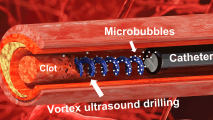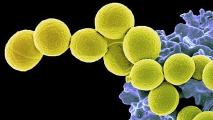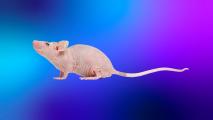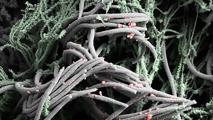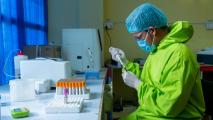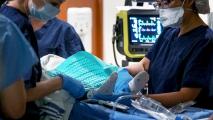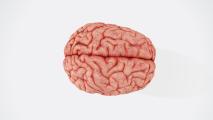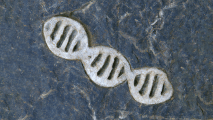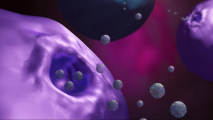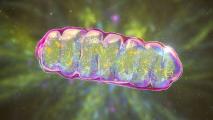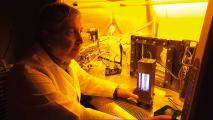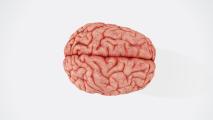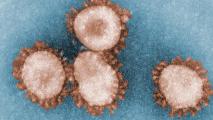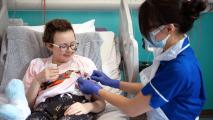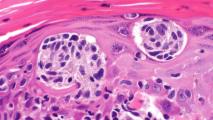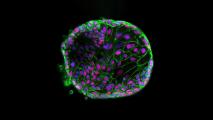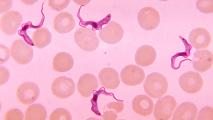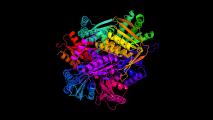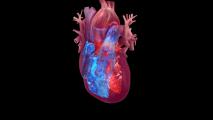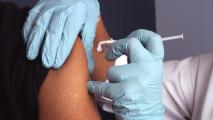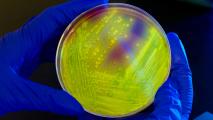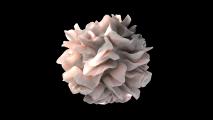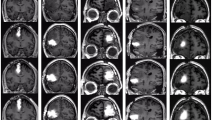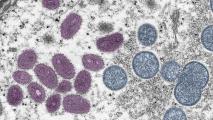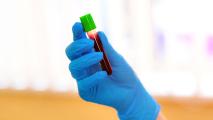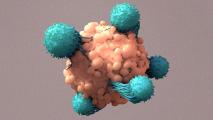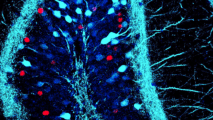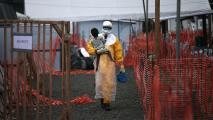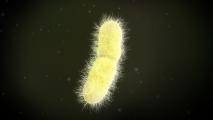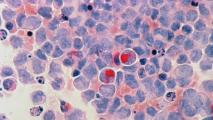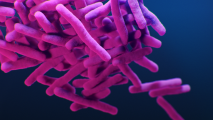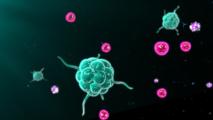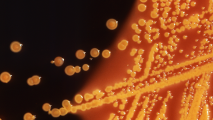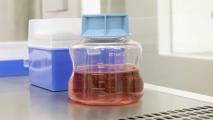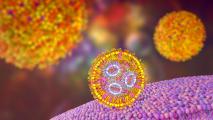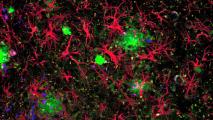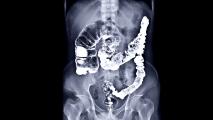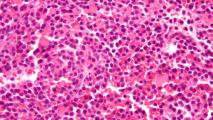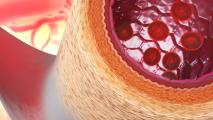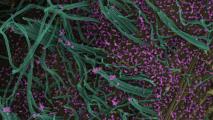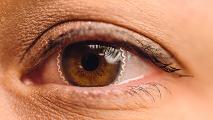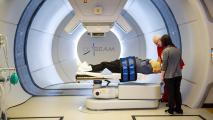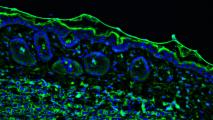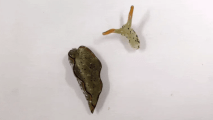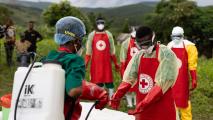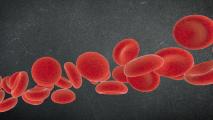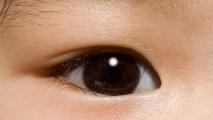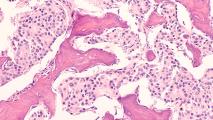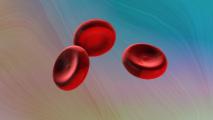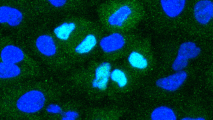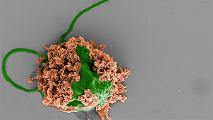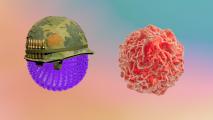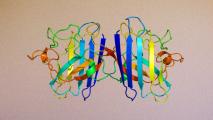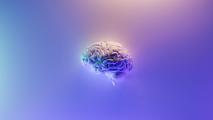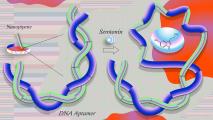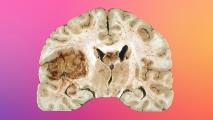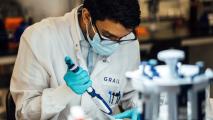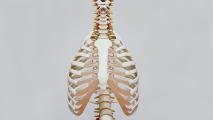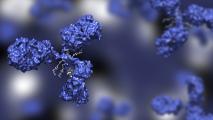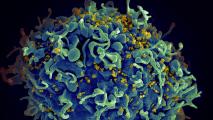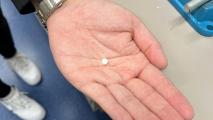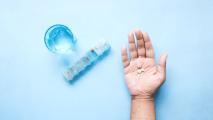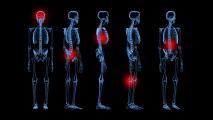Field: Medicine
This “ultrasound vortex” can quickly clear blood clots
Using spiraling ultrasound waves, researchers hope to remove stroke-causing blood clots faster and safer.
Microbiome-safe method could head off Staph infection
A microbiome-friendly method of controlling Staph colonization has aced phase 2 clinical trials.
New biomarker test accurately predicts who will respond to antidepressant
Alto Neuroscience’s depression drug seems effective in early trials, a proof-of-concept for biomarker-based design.
New mRNA vaccine factory is made from shipping containers
BioNTech is sending a modular mRNA vaccine factory that can produce 50 million COVID-19 vaccines annually to Africa.
Moderna’s RSV vaccine over 80% effective in early analysis
Moderna’s mRNA RSV vaccine for adults looks to be over 80% effective, based on early data from a large phase 3 trial.
Particles packed with mRNA reduce wrinkles in mice
A new delivery method for mRNA therapies could open the doors to better treatments for aging, cancer, and more.
Stanford nasal study could lead to “morning after” virus spray
A “morning after” antiviral nasal spray could be created using new knowledge about how SARS-CoV-2 invades your nose.
5 biotech trends to watch in 2023
After a monumental year of breakthroughs, scientists, investors, and CEOs share which areas of biotech they are eagerly watching this year.
New brain cancer treatment trialed in children for the first time
MRI-guided focused ultrasound has been used to deliver chemo into the brain of a pediatric cancer patient for the first time.
“Jumping genes”: A new model of Alzheimer’s
A new hypothesis suggests that Alzheimer's disease is the result of "jumping genes" in the brain, not inflammation or plaque.
Resurrecting a 2.6 billion-year-old ancient CRISPR system
Researchers have resurrected an ancient CRISPR system 2.6 billion years old, capable of editing genes in the modern day.
Google sister company aims to eradicate dengue from a tropical country
Verily, owned by Google parent company Alphabet, believes it can eliminate Singapore’s dengue problem.
The first ever honey bee vaccine has arrived
The USDA has conditionally approved a honey bee vaccine to protect the important insects from American foulbrood, a brutal bacterial infection.
Chickenpox and shingles virus lying dormant in your neurons can reactivate and increase your risk of stroke
People with shingles have an approximately 80% higher risk of stroke than those without the disease, and researchers want to know why.
FDA approves new Alzheimer’s medication
Lecanemab, a new Alzheimer’s medication shown to slow cognitive decline in patients, has been granted accelerated approval by the FDA.
Mother’s mitochondria used to treat her child’s rare genetic disorder
A new therapy that treats children with rare mtDNA mutations using mitochondria sourced from their mothers has now been tested in patients.
New mRNA universal flu vaccine against all known subtypes takes promising first steps
A new universal flu vaccine candidate that uses mRNA to target all known flu subtypes looks promising in animal models.
New stem cell patches could repair babies’ heart defects permanently
Stem cell patches under development in the UK might allow surgeons to permanently repair infants congenital heart defects.
Seven science and tech breakthroughs you may have missed this year
A roundup of major science and tech achievements that flew under the radar in 2022, including new vaccines, advanced solar cells, and more.
How to use the brain’s own immune cells to stave off Alzheimer’s
Research suggests that microglia play a key role in preventing neurodegenerative diseases by helping to remove toxic waste.
New “future-proof” drug can fight COVID-19 and the common cold
Researchers have identified a compound capable of stopping multiple coronaviruses in cell and tissue models.
First-of-its-kind therapy sends girl’s incurable cancer into remission
A first-of-its-kind CAR T-cell therapy sent a UK girl’s blood cancer into remission when all other treatments failed.
Moderna’s mRNA cancer vaccine reduces risk of recurrence or death by 44%
Moderna’s new mRNA cancer vaccine reduced melanoma patients’ risk of recurrence or death by 44% compared to a standard treatment alone.
Cheap liver drug can prevent COVID-19
A cheap, readily available drug used to treat liver disease could also prevent COVID-19 infections — regardless of the variant.
A new class of antidepressant works in 2 hours
Most types of antidepressants work by increasing neurotransmitter levels throughout the brain, which take weeks. A new drug takes hours.
Breakthrough drug cures sleeping sickness with one dose
A new, one-dose treatment for lethal sleeping sickness was 95% effective at clearing the parasite from patients.
“DALL-E 2 of biology” designs proteins for new drugs
The Chroma AI's ability to design proteins with structures no one has ever seen before could revolutionize medicine.
These tiny bubbles are “warheads” for killing cancer
By combining tiny nanobubbles with ultrasound, Israeli researchers showed they can destroy tumors.
Old Parkinson’s drug helps teens with type 1 diabetes
The Parkinson’s disease drug bromocriptine lowered blood pressure and reduced aortic stiffness in young people with type 1 diabetes.
Scientists uncover key to future hepatitis C vaccine
While treatments are available for HCV-related infections, they are expensive, hard to access, and do not protect against reinfection.
FDA approves US’s first fecal transplant therapy
The FDA has approved Rebyota, a slurry used during fecal transplant therapy to treat recurrent C. difficile infections.
How flu got milder since 1918 pandemic
The risk of death from influenza has declined over time, but globally, hundreds of thousands of people still die from the disease each year.
Newly discovered gut bacteria may be a culprit behind rheumatoid arthritis
This bacteria is found only in the intestines of people with rheumatoid arthritis, and not in the intestines of healthy people.
How to fight Covid with light
Some wavelengths of light in a range called far-UVC kill microbes in experiments and appear to be harmless to people.
The (robotic) doctor will see you now
Study finds patients are receptive to interacting with robots designed to evaluate symptoms in a contact-free way.
New brain cancer vaccine completes clinical trial
Northwest Biotherapeutics reports that its new brain cancer vaccine can extend glioblastoma patients’ lives by months or even years.
New chemo pump for brain tumors could avoid side effects
A fully implantable chemo pump could help extend the lives of people with deadly brain tumors while minimizing treatment side effects.
UK study suggests single dose of monkeypox vaccine is 78% effective
A new analysis by the UK Health Security Agency has determined that one shot of a monkeypox vaccine is 78% effective at preventing infection.
$3.5 million treatment for hemophilia wins FDA approval
The FDA has approved biotech company CSL Behring's Hemgenix, a hemophilia B treatment that costs $3.5 million per dose.
New CRISPR cancer treatment tested in humans for first time
A new personalized CRISPR cancer treatment modifies the immune system's T cells to help them recognize a specific patient's tumor cells.
Good and bad memories are stored in different neurons, study finds
Positive and negative memories are stored in different parts of the brain, raising the possibility of therapeutic memory manipulation.
Injectable gel repairs severe spinal cord injuries and enables mice to walk
An injectable gel that prevents scar formation and stimulates regeneration successfully repaired severe spinal cord injuries in mice.
Study finds mindfulness as effective as medication for anxiety
An intensive form of mindfulness was found as effective as Lexapro in treating anxiety in adults in the first head-to-head comparative study.
Moderna to develop mRNA vaccines for Ebola
Moderna is reportedly nearing a deal with the DoD to develop mRNA vaccines for biological threats like Ebola
Cheap blood pressure med could help treat alcoholism
Spironolactone, a cheap medication used to treat high blood pressure, might also be able to help people overcome alcohol use disorder.
Brain implant translates neural activity into letters, letting a paralyzed man “speak”
A new device allowed a paralyzed patient to "speak," spelling out full sentences in real-time with an error rate of about 8%.
Old herpes drug helps kill deadly superbug
The anti-herpes drug edoxudine can weaken the deadly superbug K-pneumoniae, potentially offering a new weapon against antibiotic resistance.
Doctors may not be ready for blood tests that screen for multiple cancers at once
MCED tests are different from existing ones because they are trying to detect early-stage cancer, when there aren’t that many tumor cells.
African researchers push for a human challenge trial to fight TB
Tuberculosis kills over a million people a year. Researchers in Malawi are pushing for a clinical trial that may help change that.
A new therapy sends lupus into remission
Five patients in Germany had their lupus wiped out by CAR T-cell therapy.
Engineered bacteria may fight this brain-damaging genetic disorder
A possible phenylketonuria therapy using engineered bacteria has shown positive results in a small phase 2 trial.
A malaria-fighting antibody has passed phase 2 trials
An antibody designed to prevent malaria infection has proven effective in phase 2 trials in Mali.
UK trials world’s first lab-grown blood transfusions
UK researchers have launched the world’s first trial in which lab-grown blood cells are being transfused into another person.
New mRNA vaccine for flu and COVID-19 enters human trials
Pfizer and BioNTech's new mRNA vaccine designed to protect against COVID-19 and the flu has entered human trials.
New study will put the leading theory about Alzheimer’s to the test
Washington University in St. Louis is embarking on a drug trial that may also put the amyloid hypothesis to its ultimate test.
Organ regeneration could overcome liver failure, without a transplant
Patients wait from 30 days to over five years to receive a liver transplant in the U.S. What if the liver could regenerate itself instead?
New exercise study could find drugs that mimic working out
MIT and Harvard researchers mapped out many of the cells, genes, and cellular pathways that are modified by exercise or high-fat diet.
Pfizer’s RSV vaccine for pregnant women protects newborns
Pfizer plans to begin the regulatory approval process by the end of the year.
AI-discovered drug for ALS enters human trials in just four years
Verge Genomics has begun a trial of their AI-found ALS drug candidate, one of the first tests for this new method of drug discovery.
Understanding cancer’s “dark matter”
Researchers have discovered that cancer’s epigenome — changes to how genes are expressed that aren’t mutations — may play a key role in its behavior.
FDA approves first-of-its-kind blood cancer treatment
The FDA has approved Johnson & Johnson’s Tecvayli, a new blood cancer treatment for people with relapsed or refractory multiple myeloma.
Australian researchers have manufactured a living blood vessel
A blood vessel isn’t just a simple tube. Researchers at the University of Sydney have developed an implant capable of mimicking its complexities.
Flu and RSV can fuse into a new kind of virus
In a new discovery, researchers at the University of Glasgow have observed hybrid viruses capable of infecting lung cells in the lab.
New smart contact lens monitors for glaucoma 24/7
Purdue researchers have created a smart, soft contact lens that can test for eye pressure, a key indicator of glaucoma, 24 hours a day.
Experimental “FLASH” cancer treatment aces first human trial
The first-in-human trial of FLASH radiotherapy found the experimental cancer treatment to be safe and effective.
Withdrawal symptoms from antidepressants can last over a year
A scientific review found that withdrawal symptoms from antidepressants and antipsychotics can last for over a year.
Merck pays Moderna $250m for personalized cancer vaccine
Pharma giant Merck has paid Moderna $250 million to co-develop and commercialize its promising mRNA-based personalized cancer vaccine.
Scientists discover slug that can decapitate itself, grow new body
Scientists observed two species of sea slug that were able to self-decapitate, survive for weeks without organs, and regenerate new bodies.
Deep brain stimulation can be life-altering for OCD sufferers when other treatment options fall short
Deep brain stimulation relies on thin electrodes implanted deep in the brain that deliver electrical currents. Could it treat OCD?
New vaccine prevents 94% of severe RSV cases
UK drugmaker GSK’s RSV vaccine was nearly 95% effective at preventing severe infection in a phase 3 trial of older adults.
As Ebola reaches Ugandan capital, vaccines race to catch up
Caused by the Sudan strain of Ebola, current vaccines and therapies approved for Ebola won’t work in Uganda. But these might.
UK scientists solve a decades-long blood mystery
Researchers have discovered a new blood group which may have been behind the tragic loss of two babies.
Male birth control options are in development, but a number of barriers still stand in the way
A survey of over 9,000 men in nine countries found that over 55% would be willing to use a new method of male birth control.
First-of-its-kind surgery may have helped reverse baby’s paralysis
The first recipient of a groundbreaking spina bifida treatment is now one year old and showing no signs of leg paralysis.
It may be possible to treat inherited blindness, even in adults
A new mouse study suggests that synthetic retinoids may be able to help restore vision in adults with Leber congenital amaurosis.
Cambridge researchers have discovered how cancer spreads
New research out of the University of Cambridge may have discovered a mechanism behind metastasis.
New test catches deadly bloodstream infections much faster
Bloodstream infections have a high mortality rate. But a new test to catch them faster could lead to more saved lives.
A newly discovered class of RNA can fight off multiple viruses, including flu and SARS-CoV-2
Harvard-affiliated researchers have discovered a form of double-stranded RNA which may be a potent antiviral.
Tiny robots completely clear out deadly pneumonia infection in mice
Researchers have created microscopic robots capable of clearing pneumonia from the lungs of mice.
A modified herpes virus completely wiped out a terminal cancer
In a small phase 1 trial of a herpes-based cancer therapy, one patient had their tumors completely eliminated.
Scientists claim “never before” seen results in ALS clinical trial
The ability of tofersen, a gene-based treatment for ALS, to improve symptoms is being hailed as a “treatment milestone.”
New Alzheimer’s drug slows mental decline by 27% in clinical trial
Eisai and Biogen are reporting that their new Alzheimer’s antibody slowed cognitive decline by 27% in a global trial.
Shape-shifting DNA is helping researchers decode the human brain
Researcher Nako Nakatsuka has turned to DNA to tackle an important challenge: how do we measure chemicals in the brain?
What’s causing the alarming rise in cancer for adults under 50?
A new review finds that 14 different cancers, including eight related to the digestive system, are increasing in people under age 50.
Creatine, a popular exercise supplement, might help treat depression
Creatine shows promise as a treatment for depression, boosting the effects of SSRIs and potentially working as a standalone medication.
Axolotls can regenerate their brains
Axolotls are a model organism researchers use to study a variety of topics in biology because of their regenerative abilities.
New treatment “starves” aggressive brain tumors in mice
A treatment that “starved” aggressive glioblastoma tumors in the brains of mice suggests a way to finally fight the deadly cancer in humans.
Meth addiction treatments are finally on the horizon
New antibody and drug therapies may soon help treat meth patients, who currently have no pharmacological interventions.
Blood test can find dozens of types of cancer, with few false positives
Grail’s Galleri multi-cancer blood test found multiple cancers in a study of over 6,000 patients.
ARPA-H: High-risk, high-reward health research is the mandate of new, billion-dollar US agency
A new multibillion-dollar federal agency was created with a goal of supporting “the next generation of moonshots for health.”
Long COVID: Self-targeted immune attacks may lurk behind it
Researchers are working to get a more complete understanding of the cells and antibodies behind long COVID.
How NASA is planning to prevent a Martian plague
When Mars samples arrive, they may carry more than knowledge. To offset the chance of a Martian pandemic, NASA is learning to contain a Red Planet plague.
Breakthrough drug could save hundreds of thousands of children’s lives
A booster dose of the University of Oxford’s malaria vaccine demonstrated up to 80% efficacy in children over a year of follow-up.
Newly discovered antibody neutralizes all variants of the coronavirus
Using modified mouse models originally designed for HIV, researchers have discovered an antibody that stops all known strains of COVID-19.
At long last, we might have an HIV vaccine
Due to HIV-1's extraordinary diversity, a vaccine needs to induce antibodies that can target many different strains.
First-of-its-kind trial will attempt to grow mini livers in people
A new treatment that could turn a single donor liver into “mini livers” capable of saving 75 or more lives is heading into human trials.
Woman with rare gene mutations feels no pain, anxiety
A woman in Scotland was found to feel virtually no pain and report zero trace of any anxiety or depression.
Insulin pills could end the need for painful injections
Insulin pills designed to be dissolved in the mouth appear to overcome a major hurdle holding back the development of oral insulin.
5 drugs that changed the world (and what went wrong)
Anesthesia, penicillin, antibiotics, diazepam, and the birth control pill have all radically changed our lives.
“Synthetic biomarkers” could catch your cancer in the future
When the body’s own biomarkers aren’t enough, researchers have begun creating their own to help fight cancer.
